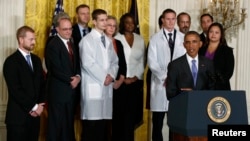President Barack Obama says the United States cannot hermetically seal itself off from Ebola. The U.S. leader made the comments Wednesday, flanked by American health care workers who have been on the front lines of the battle against the deadly disease.
Dr. Kent Brantly was the first American with Ebola to be successfully treated in the United States.
On Wednesday, Brantly - who contracted Ebola while caring for patients in Liberia - said the struggle to stem the outbreak in West Africa is far from over.
“More medical personnel are desperately needed. At this time, perhaps more than any other, we feel the impact of our position as citizens of not only the United States of America, but as citizens of the world,” said Brantly.
Standing alongside fellow health care workers at the White House Wednesday, Brantly introduced President Obama, who lauded their contributions in the fight against Ebola.
Amid all the talk and controversy surrounding quarantining those who are returning from West Africa, Obama made clear his appreciation for American medical professionals leading efforts to stem the disease thousands of kilometers away.
“A lot of people talk about American exceptionalism. I’m a firm believer in American exceptionalism. You know why I am? It’s because of folks like this. It’s because we don’t run and hide when there’s a problem,” said he.
President Obama said U.S. efforts in West African countries are making a difference, with critical infrastructure cutting Ebola testing times and safe burial practices doubling in places like the Liberian capital, Monrovia.
The American leader, however, also made clear that affected nations face a long, hard battle to stem the severe outbreak and that the United States must continue to fight Ebola at its source.
“Until we stop this outbreak in West Africa, we may continue to see individual cases in America in the weeks and months ahead because that’s the nature of today’s world. We can’t hermetically seal ourselves off, said Obama.“
The president’s remarks came as the World Health Organization said the rate of new Ebola infections in Liberia appeared to be on the decline.
Still, with nearly 5,000 people dead and the number of cases likely underreported, U.N. health officials caution the crisis is far from over.




